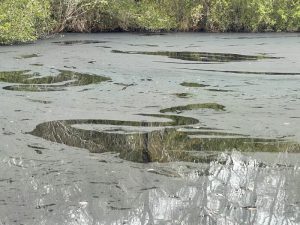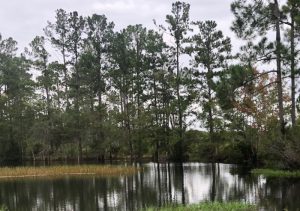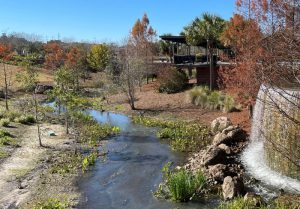Our Gardening in the Panhandle blogs cover many horticultural topics concerning yards, however let us not forget about properties that contain a body of water (pond, lake, retention or detention basin, stream, river or Gulf of Mexico). Out of the nine Florida-Friendly Landscaping™ principles, five directly deal with water quality. Those principles are #2 Water Efficiently, #3 Fertilize Appropriately, #6 Manage Yard Pests Responsibly, #8 Prevent Stormwater Runoff, and #9 Protect the Waterfront. An easy argument can be made that the remaining four principles (#1 Right Plant, Right Place, #4 Mulch, #5 Attract Wildlife, and #7 Recycle) can also impact water quality on your properties.
The quickest and easiest way to start improving water quality is setting up a maintenance-free zone along your shore. At minimum, you should keep all chemicals 10′ away from the water’s edge and increase that distance as your slope becomes steeper. Chemicals include all fertilizers (#3) and any pesticides/herbicides (#6) meant for the landscape (there are times when situations arise where treatment of the water is warranted). If you must fertilize up slope, make sure to reduce irrigation (#2) to about 25% of normal the first time which keeps the fertilizer from dissolving and running down your slope’s surface (#9).
If possible replace turfgrass with a no mow zone containing plants adapted for shorelines to prevent applications of fertilizer and chemicals. Plants (#1) other than turfgrass will have deeper roots, stabilize the bank better and absorb more chemicals before entering the water. These taller plants in turn can become habitats (#5) for birds and other specimens which can increase your ecosystem’s biodiversity. Some properties have collection swales or low lying areas where water pools and then flows into the water. It is best to understand how water flows through the property and reduce chemicals in those areas too (#8).

Heavy rains caused water levels to raise around this pond and decomposing leaf litter added a film over the pond.
As gardeners, we tend to compost our leaves and yard debris (#7) plus use mulch (#4) to reduce water loss from our soils. Keep mulches and compost piles away from flood zones and when possible keep leaves from washing into your water as they can create films on the surface. Never allow grass clippings to land on water surfaces as they will add nutrients when tissue decays.
As Florida continues to grow, we all must play an important role in keeping our water clean and safe for us, animals, birds, and aquatic life. If you have questions on improving your water quality, please contact your local county Extension Agent or Water Regional Specialized Agent (RSA). For additional information visit these other sites.
Protecting Florida’s Water Resources: https://gardeningsolutions.ifas.ufl.edu/care/florida-friendly-landscapes/floridas-water-resources.html
Living on Water’s Edge: http://www.sarasota.wateratlas.usf.edu/upload/documents/LivingontheWatersEdgeFreshwater.pdf
Urban Fertilizer Ordinances in the Context of Environmental Horticulture and Water Quality Extension Programs: Frequently Asked Questions: https://edis.ifas.ufl.edu/publication/AE534
- Hickory Gall and Anthracnose, a Deadly Combination? - September 9, 2021
- It’s Green, Gelatinous and in My Lawn - August 11, 2021
- Vines, Vines, Vines:What’s Growing Up My Trees? - July 1, 2021


